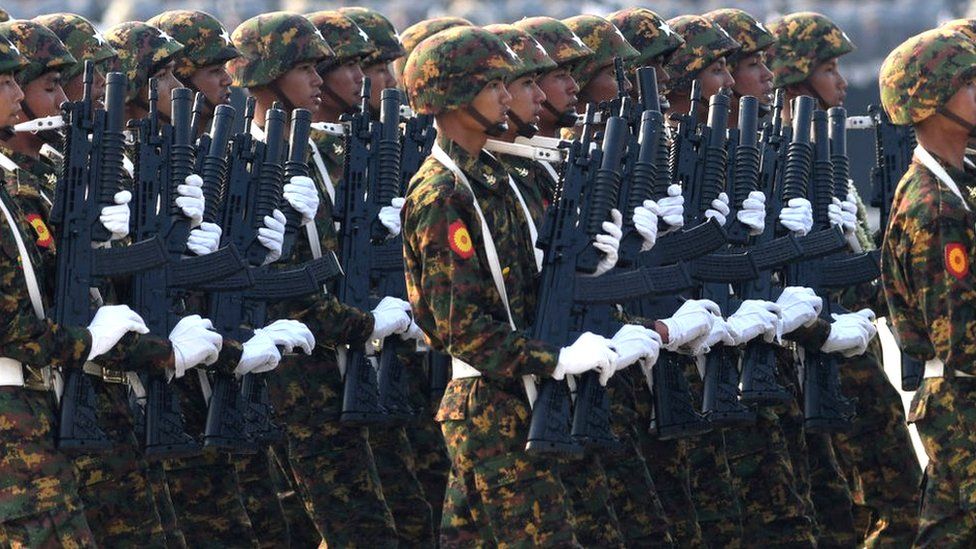-

-
-
Loading

Loading

The military government in Myanmar has suffered a significant blow as it lost control of much of its border with China within a matter of days. Three ethnic insurgent armies in Shan State, backed by other armed groups opposing the government, launched a coordinated attack that resulted in the capture of dozens of military posts, border crossings, and trade routes with China. This setback is the most severe one for the junta since it seized power in February 2021, leaving the military appearing weak and vulnerable. The government responded to the attack with airstrikes and artillery bombardments, displacing thousands of people from their homes. However, it has been unable to regain the lost territory or bring in reinforcements. The casualties include the commander of government forces in northern Shan State, Brigadier General Aung Kyaw Lwin, marking the highest-ranking officer killed in combat since the coup. This attack carries significant importance as it is the first time that the well-armed insurgents in Shan State have explicitly aligned themselves with the broader campaign to overthrow the junta and restore democracy. However, the insurgent groups also have their own ambitions to expand the territory they control. China, which typically acts as a restraining influence on the groups along its border with Myanmar, did not prevent this operation, possibly due to its frustration with the military government's inaction regarding the scam centers operating in Shan State. These centers have exploited Chinese citizens and foreigners, and the insurgents aim to shut them down. Furthermore, opposition activists had previously called for an armed uprising against the junta after peaceful protests against the coup were violently suppressed. Many fled to areas controlled by ethnic insurgents along Myanmar's borders with Thailand, China, and India to gain training and access to weapons. While some ethnic armies allied themselves with the National Unity Government (NUG), established by the deposed elected administration, others, particularly in Shan State, chose not to align with the NUG. Shan State has a history of conflict, poverty, and fragmentation since Myanmar's independence. Various warlords, drug bosses, and ethnic rebels have fought among themselves and against the army. Four smaller ethnic groups and the powerful Wa group currently maintain significant armies in the region. The Wa, known for their sophisticated weapons and Chinese backing, have generally evaded clashes and declared neutrality in the conflict between the junta and the opposition. On the other hand, the Kokang, Ta'ang, and Rakhine ethnic armies formed the Brotherhood Alliance and have provided training, sanctuary, and some weapons to dissidents from other parts of Myanmar. Although they participated in peace talks with the military in June under China's pressure, their recent attack indicates a departure from staying out of the wider civil war. The Brotherhood Alliance has swiftly advanced in their attack, with entire army units surrendering without resistance. They have seized numerous military posts, four towns, and important border crossings, disrupting military reinforcements. They have also encircled Laukkaing, a town known for its scam centers, causing chaos among the trapped foreign nationals. The Brotherhood Alliance aims to overthrow the military government, aligning with the NUG's goal. The NUG, currently waging an armed struggle against the military, has celebrated the alliance's success and hinted at a new momentum in their fight. The People's Defence Forces, supportive of the NUG but less armed and experienced than the Shan insurgents, have also launched attacks in areas near Shan State, taking advantage of the military's weakened state. Additionally, the Brotherhood Alliance strategically launched their attack shortly after an incident in Laukkaing that irritated China. China has pressured the military government to crack down on scam centers, and the alliance promised to close them to appease China. While China has publically called for a ceasefire, the Brotherhood Alliance claims to have received no direct request from the Chinese government to stop fighting. The ultimate aim of the Brotherhood Alliance is to secure as much territory as possible in preparation for a potential collapse of the military government, strengthening their position for future negotiations on a new federal structure for Myanmar, as promised by the NUG if the junta is overthrown. The longevity of the conflict and the ethnic armies' different territorial interests pose challenges for establishing a democratic future in Myanmar.